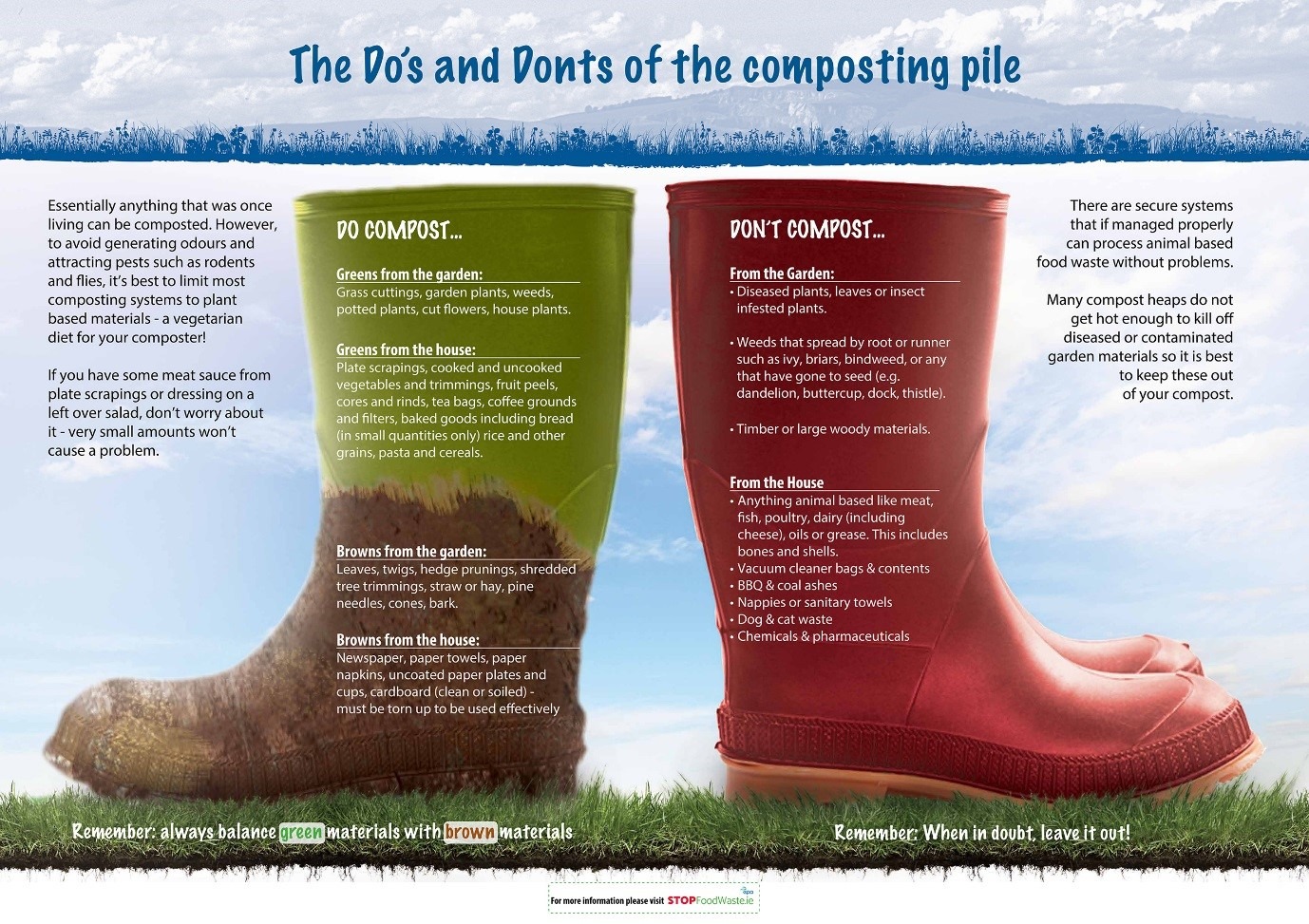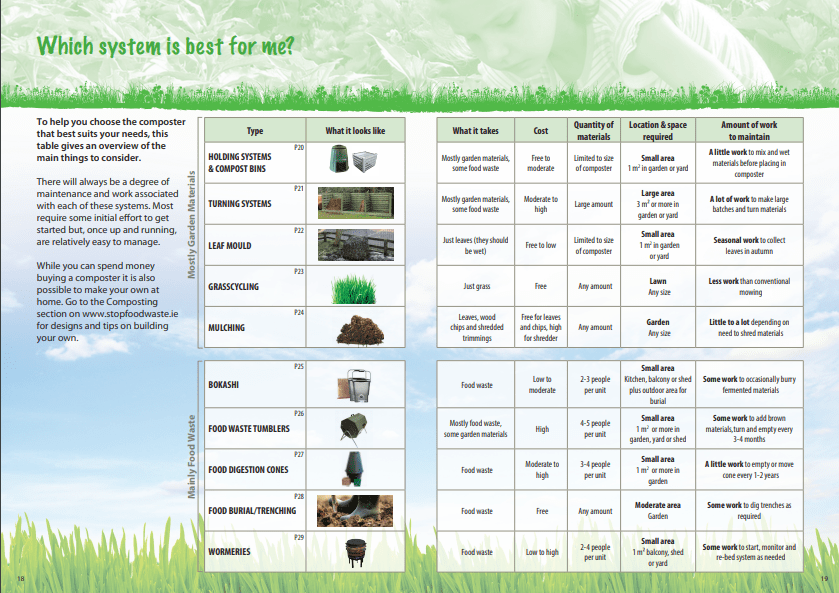Home composting
Information for those who want to home compost and for those who currently do not have access to a food waste collection service.
We have put together some information for those who want to home compost and for those, particularly in rural areas, who currently do not have access to a food waste collection service and would like to keep food waste out of their general waste bin.
To start off, there are various methods by which you can do this at home but let’s be clear, it is not as simple as throwing all of your food and garden waste in a pile and expecting a good compost as a result.
What is compost?
Compost is crumbly, dark, humus-like material that is the result of the controlled aerobic biodegradation of organic material—or composting.
Let’s go back to Junior Certificate geography to remind us what humus is: it is a part of soil that contains recently broken down organic material, such as plants, dead organisms, manure etc. Essentially, it is the part of the soil, which contains all the recycled nutrients from a system that can be used again.

Source: http://jcgeography.preswex.ie/chapter-22-our-living-soil.html
It generally is a lot darker in colour and moister than the rest of the soil, contains a large amount of nutrients and living organisms, and is a large portion of the topsoil in a natural ecosystem.
What is composting?
Composting means the controlled decomposition of organic material such as light garden waste, vegetables scraps, wood shavings, cardboard and paper. It is a means of recovery or recycling of organic matter into compost, for soil improvement or as a fertilizer.
The compost you can make at home is rich in nutrients and full of life and when used in your garden and on your plants, feeds the ecosystem of the soil and slowly releases nutrients that plants can absorb. Using compost is the foundation of maintaining healthy soil for stimulating all plant growth and creating a beautiful garden.
Why compost at home?
Home composting will help to reduce the amount of waste that goes to the landfill or incineration [if you don’t have a food waste collection service] and re-uses valuable nutrients that would have otherwise gone to waste. Food waste is a huge problem worldwide and throwing out a big portion of the food produced is a lot of wasted energy.
- It can save you money two fold; one you don’t need to pay for a collection service and two you get a good quality compost as the result
- You will be reducing the need for resources used in the processing of your food waste
- You will help to protect biodiversity using your homemade compost in place of shop bought compost which can be made of peat
- You will be helping to build up healthy soil by placing nutrients back in there.
How does composting work?
Composting is a biological process that requires food (organic materials), water and air. The process involves a wide variety of organisms, which are naturally present in our environment.
Here is the science

Source: https://untamedscience.com/biology/ecology/ecology-articles/the-science-of-compost/
Aerobic Biodegradation
Your compost will require oxygen in order to be effective as all of the microorganisms are aerobic [they require oxygen to breakdown substances]. Very simply these organisms consume the organic material for energy to build proteins and to live, by doing so this breaks down complex organic structures into basic elements along with CO2, heat and water vapour.
Organisms Involved
In the beginning of the composting process, soil bacteria are the first to start breaking down plant tissue, they are the most numerous and effective decomposers.
Other composting organisms, including protozoa, fungi, moulds, worms, snails and other insects, also take part later on in the composting process. No one organism or group of organisms are responsible for composting. A succession of creatures makes it all happen. It is a web of life similar to the ecosystem in the soil.
Thermal Phases
Your compost will go through three thermal phases before it is ready for use.

Source: https://untamedscience.com/biology/ecology/ecology-articles/the-science-of-compost/
The ingredients for good composting
The main thing to realise is that composting is different from natural decomposition because it is normally a carefully controlled environment.
A good compost heap is one in which:
- all of the material is broken down relatively quickly, with reduced odours;
- is hygienic (has destroyed all pathogens, make sure no pet waste goes in there);
- does not contain viable seeds from weed plants [as these can end up growing];
- emits lower greenhouse gases while breaking down and
- Retains the highest possible amount of nutrients for later use as fertiliser.
In order to maintain this, control of the following variables is key:
- temperature
- moisture
- oxygen
- chemical and physical composition
- the size and shape of the heap.
There is an optimum range for each of these elements to produce the most efficient compost.
However, in general, a good compost heap simply has a good mix of materials (woody, dry material and rich, organic material), is kept moist, is aerated, and is maintained at a size and shape that is sufficient for the process to occur but is not so big as to stop oxygen from reaching the centre.

Source: https://untamedscience.com/biology/ecology/ecology-articles/the-science-of-compost/
How do I know when it is ready?
Use your senses to tell when compost is ready:
Look at it
If the compost is dark in colour and it is hard to recognise the original raw materials – it looks ready.
Touch it
If the compost is not hot or warm and has a texture of rich soil, breaks apart easily and is crumby to the touch – it feels ready.
Smell it
If the compost has a pleasant earthy smell, and it looks and feels ready, then it is ready!
If the composting material is hot, smells strong, or you can recognise the raw materials in the pile- then it is not ready to use and will need more time. Just let it rot a while longer.
How Do I Use Compost Around My Home?
Where there are plants, there is a need for compost. Compost has so many uses you will never run out of ways to use this black gold.
Compost can be used as a:
- Mulch in annual or perennial planting areas.
- Topdressing on lawns or turf areas.
- Soil amendment when preparing the soil for planting turf, annuals, perennials, shrubs or trees.
- Ingredient in a potting mix of two-thirds garden soil and one-third compost.
- Ingredient in a seed starting mix of half sand and half compost.
- Way to make compost tea.


